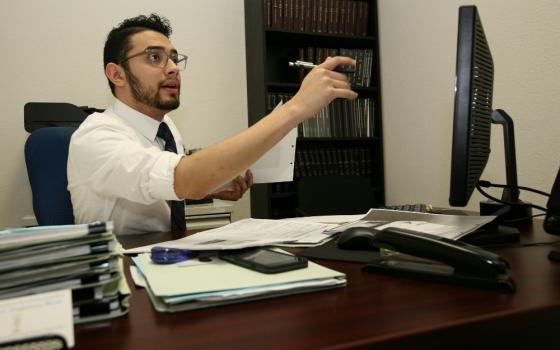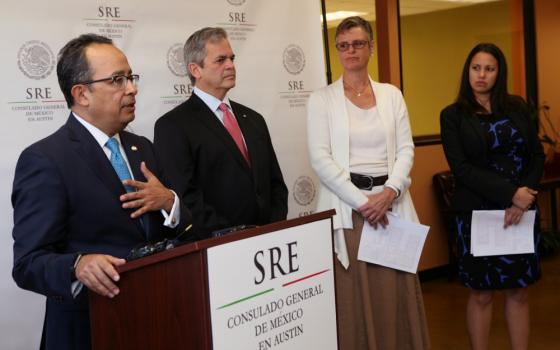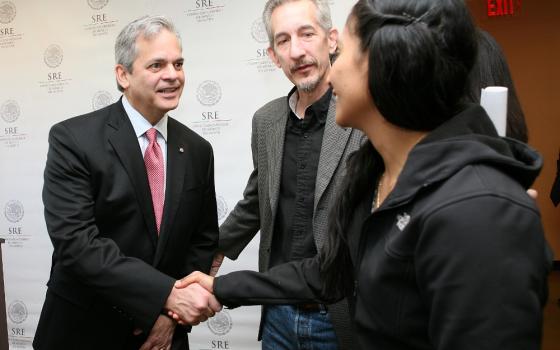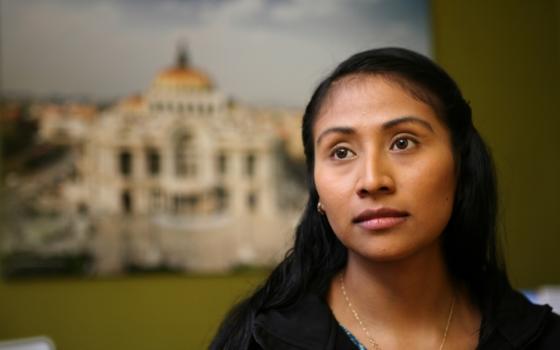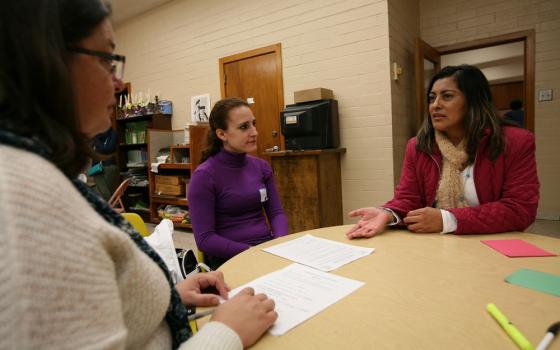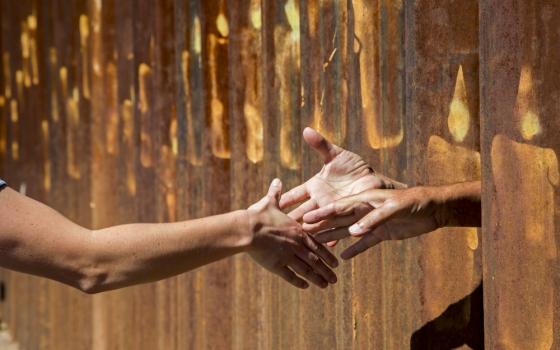Advocates and attorneys for undocumented immigrants aren't waiting until Inauguration Day to assist the millions of people who find their status in even greater jeopardy given the campaign rhetoric by President-elect Donald Trump.
While unsure what immigration policy will look like under a Trump administration, they are focused on organizing into networks and coalitions, training workers, and educating clients about their rights before changes take place.
"When Donald Trump was elected, it was like this alarm went off in the community of those who work with immigrants," said Sr. Tracy Kemme, a member of the Sisters of Charity of Cincinnati who works in a parish of largely Guatemalan immigrants in Ohio. The parish has always been supportive of her ministry with immigrant families, Kemme said. But now Kemme and her parish will have to help the families "be aware of what the best decisions are for them at this time."
Following a bilingual Mass November 9, families — whose members often vary in citizenship status — gathered in the parish cafeteria to review their rights, learn about the political process, and voice their fears and confusion. Kemme noted some assumed Trump's election meant immediate implementation of stricter policies, but "then in the same breath," she said, "they shared their hopes and that they're placing their faith in God no matter what happens."
The U.S. Catholic Conference of Bishops announced that December 12, the Feast of Our Lady of Guadalupe, would be a National Day of Prayer for the care of migrants and refugees. In addition to prayers, homily suggestions, bulletin inserts and other materials, a one-page document in English and Spanish about actions to aid in the advocacy for migrants and refugees is being made available.
The day of prayer is part of the effort by a working group of bishops, chaired by Los Angeles Archbishop José Gomez. It was established just after the election to respond "in a pastoral, collaborative, and expedited way to the increased fear and sense of risk that migrants and refugees have experienced in recent weeks," the letter by Gomez to U.S. bishops said.
Enrique Chavira, 25, knows that fear all too well. Even weeks after the election, he flashes back to the early morning hours of November 9 when the results showed Trump's victory — and Chavira's dreams crumbled. "I had a crippling anxiety attack," Chavira said. "I couldn't do anything; I couldn't sleep."
A legal assistant in an immigration attorney's office in Austin, Texas, Chavira, who is undocumented, was angry especially at his cousins who had voted for Trump even though Chavira had helped one of them become a naturalized citizen. Chavira felt betrayed. "As an undocumented person, seeing your family, seeing that they can't even support you with that, it was really, really eye opening," he said.
During his presidential campaign, Trump pledged to build a wall along the United States' southern border to stop illegal immigration from Mexico, ban immigration by Muslims and within the first week of his presidency to "deport all criminal aliens."
Since then, he has softened his rhetoric, saying he would focus first on undocumented persons who have been convicted of crimes, and that a determination would be made on other undocumented persons "after the border is secure." It is unclear what that means for asylum seekers or immigrants with Deferred Action for Childhood Arrival (DACA) status, which allows those like Chavira, who were brought to the U.S. as minors, to receive two-year renewable work permits as long as strict conditions are met.
A request for comment from the Trump transition team went unanswered.
Trump's campaign rhetoric and his transition period statements have created much confusion. Advocates frequently use two words — fear and uncertainty — to describe the present state of the immigrant community.
"There's just a tremendous amount of fear and anxiety and we are hearing that from our affiliates around the country who are having people lining up around the block or calling in to get information," said Jeanne Atkinson, executive director of CLINIC, the Catholic Legal Immigration Network Inc. The non-profit offers support to 300 networks, Catholic and non-Catholic, which provide legal services for immigrants around the country.
Two days after the election, CLINIC posted a document online entitled: "How to Prepare for the Changes in the Presidential Administration."
One tip offered in it: "Do not open the door to immigration agents or police unless they have a legal document with your name on it." Another: "Beware of immigration scams and notarios," said another.
Other CLINIC strategies include: train more workers in removal proceedings in case they increase, screen applicants for immigration status, train more staff in networks, and "share talking points and best practices with local partners on the ground," Atkinson said.
For Lourdes Flores, director of ARISE support center in McAllen, Texas, a recent local video of U.S. Border Patrol agents approaching a woman and a child in the middle of a baseball game was a sharp call to action for her and her community.
Under the guidance of Mercy Sisters of America and Sisters of Charity of the Incarnate Word, ARISE is an organization in the Rio Grande Valley that assists with personal and community development, for both citizens and undocumented immigrants benefitting from its social services.
Flores said the encounter in the video is a reminder to residents of her community that they should continue educating one another of their rights. If Border Patrol knocks at their door, they don't have to answer, she tells them. If detained, she counsels them not to sign a paper without a lawyer present and to ask to face a judge — no matter the intimidation faced in the moment.
"We try to let them know that we can't take their fear away, but we can give them hope by letting them know what they can do," Flores said.
Though random stoppings from Border Patrol happened before Trump's election, "it seems there's been more uncalled-for stoppings at parks, or people being picked up," said Mercy Sr. Rose Weidenbenner, a social worker who provides administrative support at ARISE.
"The dignity of each human being that we work with every day, those who come across the border every day, are the people that we need to be helping, and we have helped," she said. "But now we're going to have to work harder and work upstream."
Flores worries "fear could potentially control the community," and push people into isolation by preventing them from so much as going on a walk, "making their home a jail."
At the Mexican consulate's office in Austin, Consul General Carlos González Gutiérrez announced the formation of a coalition whose goal is to provide "secure information" for immigrants. The partnership of more than 11 organizations, including Catholic Charities of Central Texas, has organized a series of "Know Your Rights" clinics throughout the presidential transition period.
"We wanted to make sure that the community was fully aware of what options were available to them and also to be out in front promoting the fact that as a Catholic organization we believe in welcoming the stranger," said Justin Estep, director of immigration legal services for Catholic Charities of Central Texas.
One of Estep's fears is the elimination of the DACA program, initiated by President Barack Obama through executive action in 2012. "My gut feeling is that the DACA program is going to at least be curtailed, if not completely cease to exist, strictly based on the rhetoric of the campaign trail and the ease with which it can be ended," Estep said.
In the cover story of TIME magazine released Wednesday, however, Trump walked back from campaign rhetoric saying he was going "to work something out" for DACA permit holders
"The rational side of me says, 'You don't know what they're going to do, so don't even worry about that right now,'" Chavira said. "They might deport me, but if they do deport me what am I going to do once I get there?"
Some note it would take years for DACA deportees to get through an already clogged immigration court system. Also affected by that backlog are asylum seekers and families in detention centers who must pass a credible fear interview in order to get a hearing before an immigration judge.
Others, such as immigration attorney, Leslie Gonzalez, are unsure changes under Trump will be that dire. In 2011, Gonzalez, the program manager of La Casita, an organization run by the Guadalupan Missionary Sisters of the Holy Spirit, saw Alabama's Republican legislature pass what many called the harshest state immigration law in the country.
"The way that the law was written was much more intimidating than the actual practice of what was able to be applied in the law, so the fears we had of massive roundups or people being deported and taken away from families with little to no warning ended up not being the reality," Gonzalez said.
While many immigrant families left the state, within a few months, the majority had returned, Gonzalez said.
While unclear what changes Trump will make to current policy, there are protections in place, said Bree Bernwanger, the managing attorney for the CARA Pro-Bono Project. The project, a partner of CLINIC, provides free legal services for women and children in the South Texas Family Residential Center in Dilley, Texas.
"Asylum and the prevention of deportation of people who meet the refugee definition is enshrined in both international and domestic law," Bernwanger said. "Any scaling back of those protections should be worrisome to all of us because it's a fundamental value of this country."
She added, however, that the lack of guaranteed representation by legal counsel for asylum seekers means many women and children face a "daunting task" just getting past the credible fear interview.
"Well over 90 percent of CARA clients pass these interviews the first time," Bernwanger said. Without representation, that number drops significantly. If the new administration tried to restrict access to attorneys either inside detention or outside, it would raise "serious due process concerns."
Since family detention facilities are usually located in remote, rural areas, there is already a shortage of immigration attorneys. At the Dilley facility, CARA attorneys represent nearly all the women and children detained there, currently about 1,100 people, Bernwanger said.
Although the fear and uncertainty of a Trump inauguration makes advocates uneasy, it has also steeled their resolve to continue fighting for immigrants. Sr. Mary Pellegrino said the Leadership Conference of Women Religious will continue to prioritize immigration regardless of the changes in the White House or the national mood. Pellegrino, a member of the Sisters of St. Joseph of Baden, Pennsylvania, is president of LCWR, which represents about 80 percent of the nearly 50,000 women religious in the United States.
And while LCWR member congregations often focus their efforts locally, the national office facilitates those efforts and advocates for broad changes in policy, such as ending family detention for those seeking asylum.
"We're always advocating for ending family detention, so we were very heartened to hear about the ruling in Texas," Pellegrino said. "We also facilitate the integration of immigrants and refugees into our society — the more integrated refugees and immigrants are, the stronger our communities are."
Regardless of who is U.S. president, she said, nothing will change until people no longer have to flee poverty or violence.
"We need to address the root causes — why are people taking such drastic measure and leaving their homes and families?" Pellegrino said. "That's forced migration, and it's very different than voluntary migration."
Sr. JoAnn Persch, a Sister of Mercy and executive director emeritus and co-founder of the Interfaith Committee for Detained Immigrants, believes Trump will not be able to round up all the immigrants he promised to deport.
"There's a lot of resistance already, and people will not take this lying down," she said.
Her organization provides case management services and housing for immigrants released from detention centers. Case workers also help immigrants find attorneys, get medical and dental care, and make appointments with immigration officials. Last week she said an Immigration and Customs Enforcement official asked if she could take in more immigrants who were going to be released from detention centers.
After 10 years of helping immigrants, she said she's troubled by the pain and sadness she's seen, especially from children who are U.S. citizens but whose parents are undocumented.
"I've heard that there are children who won't go to school because they're afraid because when they come home their parents might be gone," she said.
But it's the racism and rhetoric that bother her the most.
"I've never met anybody there [in detention] who is a murderer or a rapist or were in there for serious, serious crimes," she said. "That's my problem with this whole thing, the hatred that's been engendered from this election, through the whole campaign."
Persch believes the best antidote to the racism and uncertainty is for people of goodwill to come together in faith and prayer.
"I've learned that prayer is extremely important," she said. "It's an important time to ask God to be with us in this time of transition and that's what carries me through."
[Global Sisters Report staff writers Soli Salgado and Dan Stockman contributed to this report. Nuri Vallbona is a freelance documentary photojournalist. She worked for the Miami Herald from 1993 to 2008 and has been a lecturer at the University of Texas and Texas Tech University.]
Related - 'Dreamers' respond to President-elect Trump's proposed immigration policies
and Immigration advocates, Catholic sisters, hope Texas ruling is step to ending family detention
and Brooklyn bishop pledges to support diocese's immigrants against deportations
